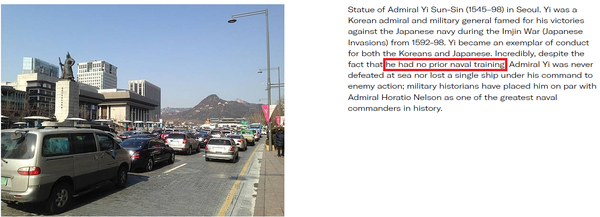
CIA World Factbook has error on Korea’s historical hero
In its latest World Factbook, the Central Intelligence Agency (CIA) mistakenly described the feat of Admiral Yi Sun-sin, Korea’s historical hero who chalked up so many victories during the Japanese invasions of Korea (1592-1598).While explaining his statue in downtown Seoul, the World Factbook erroneously noted as if the legendary admiral was not prepared for the 16th-century war (please click this link to see the controversial description).“Incredibly, despite the fact that he had no prior naval training, Admiral Yi was never defeated at sea nor lost a single ship under his command to enemy action,” the World Factbook said.Observers point out that the description is plain wrong.“It was simply impossible for the navy to fight battles without any prior training as they had to fire cannons and maneuver the ships,” former Seoul National University Prof. Yi Tae-jin said.“In his diary during the war, there were also many tales about training. Admiral Yi’s victories were supported by well-trained soldiers.”Previously, Prof. Yi headed the state-run National Institute of Korean History.Prof. Lee Min-woong of Daegu Catholic University concurred. He is one of the county’s top experts on Admiral Yi.“Admiral Yi thoroughly prepared for the war. There are records that Korea’s government official visited the training sessions of Admiral Yi’s military camp,” Prof. Lee said.Indeed, Admiral Yi built the turtle ships, which contributed much to his victories against the invading Japanese forces. He also checked the status of soldiers, supplies, and granaries in advance.Inconsistent romanization system
In addition, the CIA came under criticism for using inconsistent romanization styles for South Korean cities like Daejeon, the country’s fifth most populated city located some 140 kilometers south of Seoul.“The official city name is Daejeon. But the CIA also uses Daejon and Taejon in its World Factbook. I don’t think that the agency has any principles in spelling the city in English,” VANK founder Park Gi-tae said.“In my opinion, any foreign websites are recommended to use Korea’s official romanization system. This is a long-lasting problem. The South Korean government should do something to correct this.”Short for Voluntary Agency Network for Korea, VANK is a non-governmental outfit designed to promote a positive image of Korea by requesting foreign internet sites or agencies to correct wrong data.이 기사를 공유합니다
Tim Kim
(voc200@gmail.com)

